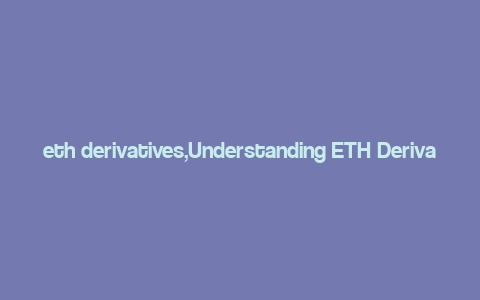Understanding ETH Derivatives: A Comprehensive Guide for You
As the cryptocurrency market continues to evolve, Ethereum (ETH) derivatives have become an integral part of the trading landscape. Whether you’re a seasoned investor or just dipping your toes into the crypto world, understanding ETH derivatives is crucial. In this article, we’ll delve into the various aspects of ETH derivatives, providing you with a comprehensive guide to help you navigate this complex market.
What are ETH Derivatives?
ETH derivatives are financial instruments that derive their value from the price of Ethereum. These instruments allow traders to speculate on the future price movements of ETH without owning the actual cryptocurrency. Some of the most popular ETH derivatives include futures, options, and swaps.
Futures Contracts
Futures contracts are a type of ETH derivative that obligate the buyer to purchase the underlying asset (ETH) at a predetermined price on a specified future date. These contracts are often used by traders to hedge against price volatility or to speculate on the future price of ETH.
| Feature | Description |
|---|---|
| Standardized Terms | Futures contracts have standardized terms, including the contract size, delivery date, and settlement method. |
| Leverage | Traders can use leverage to increase their exposure to the market,鏀惧ぇ鐩堝埄鍜屼簭鎹熴€?/td> |
| Regulatory Oversight | Futures contracts are regulated by various financial authorities, ensuring a level of security and transparency. |
Options Contracts
Options contracts give the holder the right, but not the obligation, to buy or sell ETH at a predetermined price within a specified period. These contracts are often used by traders to hedge their positions or to speculate on the future price movements of ETH.
| Feature | Description |
|---|---|
| Call and Put Options | Call options give the holder the right to buy ETH, while put options give the holder the right to sell ETH. |
| Strike Price | The price at which the underlying asset can be bought or sold. |
| Expiry Date | The date by which the option must be exercised. |
Swaps
ETH swaps are agreements between two parties to exchange the current value of ETH for a future value at a predetermined rate. These contracts are often used by institutional investors to gain exposure to the ETH market without owning the cryptocurrency.
Benefits of ETH Derivatives
There are several benefits to trading ETH derivatives:
-
Access to Leverage: Traders can use leverage to increase their exposure to the market, potentially amplifying their profits and losses.
-
Speculation Opportunities: ETH derivatives allow traders to speculate on the future price movements of ETH, regardless of whether they own the cryptocurrency.

-
Hedging: Traders can use ETH derivatives to hedge their positions against potential price volatility.
-
Regulatory Oversight: Many ETH derivatives are regulated by financial authorities, ensuring a level of security and transparency.
Risks of ETH Derivatives
While ETH derivatives offer numerous benefits, they also come with risks:
-
Leverage Risks: High leverage can amplify both profits and losses, potentially leading to significant financial losses.
-
Market Volatility: The cryptocurrency market is known for its volatility, which can lead to rapid price movements and increased risk.
-
Regulatory Risks: The regulatory landscape for ETH derivatives is still evolving, which can lead to unexpected changes in the market.
Choosing a Platform for ETH Derivatives
When trading ETH derivatives, it’s crucial to choose a reputable and reliable platform. Here are some factors to consider when selecting a platform:
- <